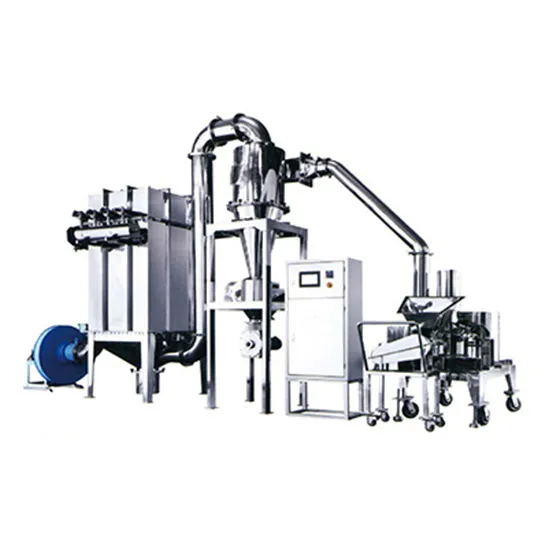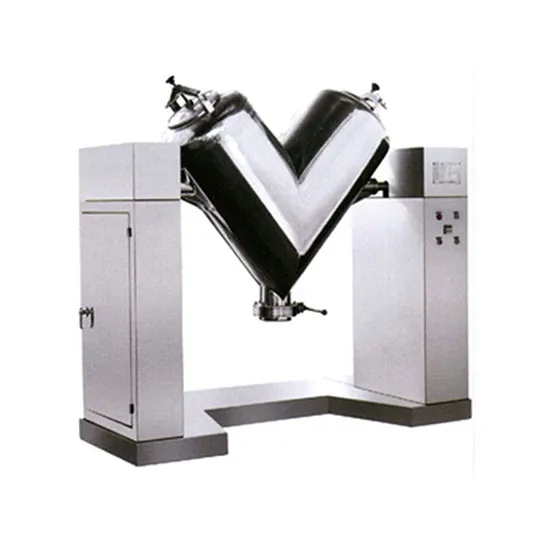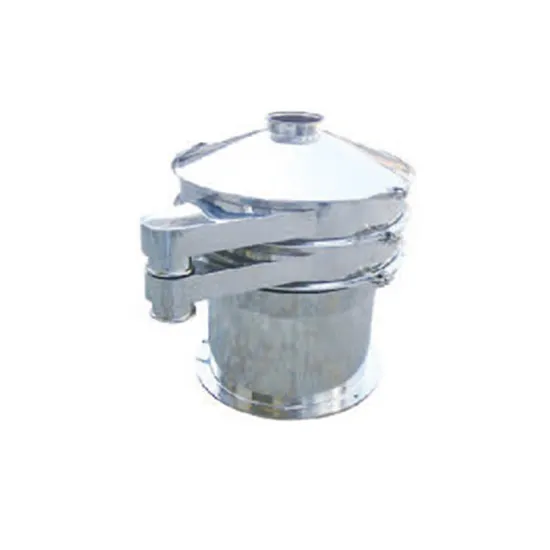NEWS
The Role of Granulation Machines in Enhancing Pharmaceutical Manufacturing
Dec 02,2023
Table of Contents:
1. Introduction: Evolution of Granulation Machines in Pharmaceutical Manufacturing
2. How Granulation Machines Work: A Step-by-Step Process
3. The Importance of Granulation Machines in Pharmaceutical Manufacturing
4. Enhancing Medication Efficacy and Safety with Granulation Machines
5. Improving Production Efficiency and Cost-effectiveness
6. Granulation Machines and Quality Control in Pharmaceutical Manufacturing
7. Addressing Challenges and Limitations of Granulation Machines
8. Frequently Asked Questions about Granulation Machines
9. Conclusion: The Future of Granulation Machines in Pharmaceutical Manufacturing
Over the years, the pharmaceutical industry has experienced tremendous advancements in manufacturing techniques and technologies. One such innovation that has revolutionized pharmaceutical production is the granulation machine. These sophisticated devices have played a vital role in enhancing the manufacturing process, ensuring the quality and effectiveness of medications.
Granulation machines employ a step-by-step process to convert fine powders into granules that are easier to handle, store, and administer. This process involves several stages, including mixing, wet granulation or dry granulation, drying, and sizing. Each step is carefully executed to ensure optimal granule formation and uniformity.
Granulation machines hold immense significance in pharmaceutical manufacturing. They facilitate the production of pharmaceutical granules, which serve as the building blocks for various dosage forms such as tablets, capsules, and pellets. These machines not only improve the physical properties of the granules but also enhance their flowability, compressibility, and dissolution rate.
Granulation machines contribute significantly to the efficacy and safety of pharmaceutical products. By facilitating the uniform distribution of active pharmaceutical ingredients (APIs) within the granules, these machines ensure consistent dosage and minimize the risk of dose variability. Additionally, granulation helps to protect sensitive APIs from degradation, enhancing their stability and shelf life.
The utilization of granulation machines in pharmaceutical manufacturing enhances production efficiency and cost-effectiveness. Through the optimization of granule properties, these machines enable better flow and reduced segregation during the manufacturing process. This leads to more efficient tabletting and encapsulation processes, minimizing production waste and maximizing yield.
Granulation machines play a crucial role in maintaining stringent quality control in pharmaceutical manufacturing. By ensuring uniform granule size, density, and composition, these machines contribute to the consistency and reproducibility of the final dosage forms. This, in turn, translates into medications with predictable release profiles, improved patient compliance, and enhanced therapeutic outcomes.
While granulation machines offer numerous benefits, it is important to acknowledge their challenges and limitations. Some common issues include the potential for cross-contamination, the need for specialized cleaning procedures, and the requirement for additional equipment for drying and sizing processes. However, advancements in technology continue to address these concerns, making granulation machines increasingly efficient and reliable.
Q1: What are the different types of granulation machines used in pharmaceutical manufacturing?
A1: There are various types of granulation machines, including high shear granulators, fluid bed granulators, and rotary drum granulators.
Q2: How do granulation machines contribute to the overall quality of pharmaceutical products?
A2: Granulation machines improve the physical properties of the granules, ensure uniform distribution of APIs, and enhance dosage consistency.
Q3: Are granulation machines suitable for both small-scale and large-scale pharmaceutical manufacturing?
A3: Yes, granulation machines are available in different sizes and capacities, catering to the needs of both small-scale and large-scale pharmaceutical production.
Q4: What measures can be taken to minimize cross-contamination risks associated with granulation machines?
A4: Proper cleaning procedures, including equipment disassembly and thorough cleaning, can help minimize cross-contamination risks.
Q5: Can granulation machines be integrated into automated pharmaceutical manufacturing systems?
A5: Yes, granulation machines can be seamlessly integrated into automated manufacturing systems, ensuring efficient and streamlined production processes.
Granulation machines have proven to be indispensable in the realm of pharmaceutical manufacturing. Their ability to transform fine powders into uniform and functional granules has greatly enhanced the production process, ensuring the quality, safety, and efficacy of medications. As the pharmaceutical industry continues to evolve, granulation machines will undoubtedly play an increasingly pivotal role, driving innovation and providing a solid foundation for the advancement of pharmaceutical manufacturing.
1. Introduction: Evolution of Granulation Machines in Pharmaceutical Manufacturing
2. How Granulation Machines Work: A Step-by-Step Process
3. The Importance of Granulation Machines in Pharmaceutical Manufacturing
4. Enhancing Medication Efficacy and Safety with Granulation Machines
5. Improving Production Efficiency and Cost-effectiveness
6. Granulation Machines and Quality Control in Pharmaceutical Manufacturing
7. Addressing Challenges and Limitations of Granulation Machines
8. Frequently Asked Questions about Granulation Machines
9. Conclusion: The Future of Granulation Machines in Pharmaceutical Manufacturing
Introduction: Evolution of Granulation Machines in Pharmaceutical Manufacturing
Over the years, the pharmaceutical industry has experienced tremendous advancements in manufacturing techniques and technologies. One such innovation that has revolutionized pharmaceutical production is the granulation machine. These sophisticated devices have played a vital role in enhancing the manufacturing process, ensuring the quality and effectiveness of medications.
How Granulation Machines Work: A Step-by-Step Process
Granulation machines employ a step-by-step process to convert fine powders into granules that are easier to handle, store, and administer. This process involves several stages, including mixing, wet granulation or dry granulation, drying, and sizing. Each step is carefully executed to ensure optimal granule formation and uniformity.
The Importance of Granulation Machines in Pharmaceutical Manufacturing
Granulation machines hold immense significance in pharmaceutical manufacturing. They facilitate the production of pharmaceutical granules, which serve as the building blocks for various dosage forms such as tablets, capsules, and pellets. These machines not only improve the physical properties of the granules but also enhance their flowability, compressibility, and dissolution rate.
Enhancing Medication Efficacy and Safety with Granulation Machines
Granulation machines contribute significantly to the efficacy and safety of pharmaceutical products. By facilitating the uniform distribution of active pharmaceutical ingredients (APIs) within the granules, these machines ensure consistent dosage and minimize the risk of dose variability. Additionally, granulation helps to protect sensitive APIs from degradation, enhancing their stability and shelf life.
Improving Production Efficiency and Cost-effectiveness
The utilization of granulation machines in pharmaceutical manufacturing enhances production efficiency and cost-effectiveness. Through the optimization of granule properties, these machines enable better flow and reduced segregation during the manufacturing process. This leads to more efficient tabletting and encapsulation processes, minimizing production waste and maximizing yield.
Granulation Machines and Quality Control in Pharmaceutical Manufacturing
Granulation machines play a crucial role in maintaining stringent quality control in pharmaceutical manufacturing. By ensuring uniform granule size, density, and composition, these machines contribute to the consistency and reproducibility of the final dosage forms. This, in turn, translates into medications with predictable release profiles, improved patient compliance, and enhanced therapeutic outcomes.
Addressing Challenges and Limitations of Granulation Machines
While granulation machines offer numerous benefits, it is important to acknowledge their challenges and limitations. Some common issues include the potential for cross-contamination, the need for specialized cleaning procedures, and the requirement for additional equipment for drying and sizing processes. However, advancements in technology continue to address these concerns, making granulation machines increasingly efficient and reliable.
Frequently Asked Questions about Granulation Machines
Q1: What are the different types of granulation machines used in pharmaceutical manufacturing?
A1: There are various types of granulation machines, including high shear granulators, fluid bed granulators, and rotary drum granulators.
Q2: How do granulation machines contribute to the overall quality of pharmaceutical products?
A2: Granulation machines improve the physical properties of the granules, ensure uniform distribution of APIs, and enhance dosage consistency.
Q3: Are granulation machines suitable for both small-scale and large-scale pharmaceutical manufacturing?
A3: Yes, granulation machines are available in different sizes and capacities, catering to the needs of both small-scale and large-scale pharmaceutical production.
Q4: What measures can be taken to minimize cross-contamination risks associated with granulation machines?
A4: Proper cleaning procedures, including equipment disassembly and thorough cleaning, can help minimize cross-contamination risks.
Q5: Can granulation machines be integrated into automated pharmaceutical manufacturing systems?
A5: Yes, granulation machines can be seamlessly integrated into automated manufacturing systems, ensuring efficient and streamlined production processes.
Conclusion: The Future of Granulation Machines in Pharmaceutical Manufacturing
Granulation machines have proven to be indispensable in the realm of pharmaceutical manufacturing. Their ability to transform fine powders into uniform and functional granules has greatly enhanced the production process, ensuring the quality, safety, and efficacy of medications. As the pharmaceutical industry continues to evolve, granulation machines will undoubtedly play an increasingly pivotal role, driving innovation and providing a solid foundation for the advancement of pharmaceutical manufacturing.
More News










